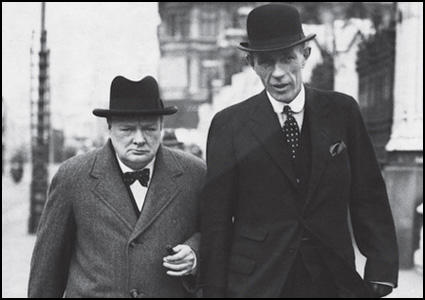Winston Churchill assumed the office of Prime Minister of the United Kingdom on 10 May 1940, just one day after Adolf Hitler marched his German forces into Denmark.1 What followed was a month of brutal bloodshed and agonizing uncertainty throughout the European continent. During this time, Churchill would find his nation on the brink of destruction, Hitler would see victory within his grasp, and a little known historical figure named Edward Wood, 1st Earl of Halifax would beseech his new Prime Minister to seek peace with the Nazi regime.2
Before Churchill took the job, Britain’s Prime Minister was a man named Neville Chamberlain. Chamberlain’s answer to the growing Nazi threat was the path of appeasement. He was not willing to throw his country into conflict so soon after World War I, and so he placated Hitler rather than openly opposing him. One of the most famous examples of this appeasement was the Munich Agreement. This pact, signed by France, Germany, Italy, and Great Britain in an effort to preserve peace on the European continent, effectively forgave Hitler for invading Czechoslovakia. Signed on 29 September 1938, the Munich Agreement stipulated that Hitler would not invade anymore countries; a promise he broke six months later. Blamed for the failure that was the appeasement strategy, Chamberlain was forced to step down from his position as Prime Minister. His successor was widely expected to be none other than his Foreign Secretary, Lord Halifax. Halifax declined the position. Though no one is exactly sure why, it is likely that Halifax felt that he was not suited to lead the country in time of war. 3 Therefore, the nation chose instead to turn to the man who had been the most vocal critic of appeasement: Winston Churchill. 4

Churchill had a daunting task before him as he took the office. Denmark had fallen, and all signs pointed to France following closely behind. One of his first acts as Prime Minister was to appoint a War Cabinet to advise him moving forward. As part of the Cabinet, Churchill appointed Neville Chamberlain as Lord President of the Council and asked Lord Halifax to keep his position as Foreign Secretary. 5 Churchill then sent the British Expeditionary Forces into France to help repel the Nazi invaders. Unfortunately, this move grossly underestimated German military capabilities, and British forces were in full retreat within a matter of weeks.
Since we know how the war ended, it is hard for us to fathom now just how dire Britain’s prospects were at the time. The Expeditionary Force was pinned on the Dunkirk Beach in France with seemingly no way of crossing the channel to get back to England. If the Germans managed to wipe out this force, which seemed imminent, Britain would have lost over 400,000 men and with them any hopes of ever stopping the Nazi conquest. In the face of utter annihilation, Churchill chose to stand firm. He ordered the commandeering of civilian boats to cross the channel and retrieve his soldiers, betting his country’s future on the long odds that these vessels could arrive before it was too late.6 Members of The War Cabinet did not share Churchill’s staunch optimism, most notable among them Lord Halifax.7 Halifax proposed a different tactic: a peace treaty with the Nazis. Halifax, being the skilled diplomat that he was, made contact Benito Mussolini, Prime Minister of Italy. Mussolini was willing to act as mediator so that Germany and the U.K. could sit down and negotiate terms for a peace agreement.8 From Halifax’s perspective this was the only way to ensure the survival of the troops trapped at Dunkirk, and the only way to save his beloved country. Though it seemed foolhardy at the time, Churchill refused to even consider peace negotiations.9 Luckily for him, and for our world, the civilian rescue mission succeeded, managing to bring most of the British troops home. Despite terrible odds, the United Kingdom lived to fight another day.

Assuming things had gone differently, and Churchill gave Halifax the go-ahead to broker a peace agreement, what might the treaty have looked like? The first thing to remember is, by all accounts, Britain was at the time posed to fall to German invasion. This meant that Halifax would have essentially been going to the negotiating table on his knees, making it unlikely that he could produce any favorable terms. Undoubtedly, Hitler would have used his advantageous bargaining position to get everything he wanted out of the deal. In exchange for safely getting the men out of Dunkirk, Nazis would have demanded that they be allowed to keep their conquered claims throughout Denmark, France, and other countries. Hitler also could have insisted that Britain not get further involved in the European conflict, allowing him to march towards Russia without worrying about the possibility of an active western front. Though it is impossible to measure whether 400,000 souls are worth such demands, it is important to keep in mind what precedent this would have set had the U.K. signed a peace treaty with Germany in Munich. Hitler took advantage of the Munich Agreement and disregarded it the moment he saw a tactical opportunity. Surely, no treaty Halifax could draft would have quelled the lust for power harbored by Hitler who stopped at nothing to establish a German world order. 10

All this we know thanks to well preserved historic records and the many biographies written since the war. We know that Churchill’s plan to resist at all costs did indeed pay off in the long run. But, looking at the events of the month of May 1940 through the eyes of the 1st Earl of Halifax, couldn’t one have concluded that the only hope for the United Kingdom was a final attempt at appeasement?
- Winston Churchill, The Gathering Storm (Boston: Houghton Mifflin Company, 1948). ↵
- Chris Hasting, “Lord Halifax tried to negotiate peace with the Nazis.” The Telegraph (August 30, 2008). ↵
- Andrew Roberts, The holy fox: a life of Lord Halifax (London: Papermac, 1992). ↵
- Ian Kershaw, Fateful choices: ten decisions that changed the world, 1940-1941 (London: Penguin Books, 2008). ↵
- Churchill, Winston. The Gathering Storm. (Boston: Houghton Mifflin Company, 1948), and Andrew Roberts, The holy fox: a life of Lord Halifax (London: Papermac, 1992). ↵
- Winston Churchill, The Gathering Storm (Boston: Houghton Mifflin Company, 1948). ↵
- Andrew Roberts, The holy fox: a life of Lord Halifax (London: Papermac, 1992). ↵
- Andrew Roberts, The holy fox: a life of Lord Halifax (London: Papermac, 1992). ↵
- Ian Kershaw, Fateful choices: ten decisions that changed the world, 1940-1941, (London: Penguin Books, 2008). ↵
- Arnold A Offner, “Appeasement Revisited: The United States, Great Britain, and Germany, 1933-1940.” The Journal of American History 64, no. 2 (1977): 373-93. ↵



90 comments
Savannah Alcazar
The first paragraph of the article set the tone for the rest to follow. I enjoyed gaining new information from this reading. It is an informative article. The map showing Dunkirk in Northern France, just across the Straight of Dover from the United Kingdom is useful with the reading. It gave me a better visual understanding of the text. I like how it ends with a question. I think it makes the article unique.
In addition, I found it to be extremely well-written in regard to grammar; I find myself to be weird about grammar and phrasing.
Shriji Lalji
What a different world it would have been if Britain would not have been able to save those men from Dunkirk. Britain would have had no men to protect them and would have fallen under the control of Hitler. However, it is just amazing to see how much faith Churchill had in his country. I would love to read a memo by Churchill of what he was considering when making the decision.
Lilia Seijas
I found this article to be pretty well written. I have always wondered what the outcome of WWII would have been if instead of appeasement, Great Britain would have immediately stopped the rapid spread of Nazi Germany. However, we can not change the course of history, and in the end, Britain was able to hold Germany back even during the time Britain was in ruins. Peace with Nazi Germany was in the end completely out of the question.
Jesus Parker
An interesting and informative read about what could have happened if Churchill gave in. It is amazing how he was able to withstand Hitler and his army for the best interest of his people. It took real courage to not give in. While most would be giving in to Hitler and his army Churchill did not take any nonsense. Without the help of the British in world war two who knows what the outcome would be.
Kenneth Gilley
This was a very interesting article. The resilience of England and Winston Churchill in the face of the horrors of war is amazing. Thank goodness that England continued to fight when all seemed lost. If they had gone ahead and signed a peace treaty with Germany, the war would have turned out so much worse, even for England. She might have had a smaller loss of life in the short term, but in the long term life under Hitler would have been catastrophic.
Cameron Lopez
This article shows the truth of Resilience between Winston Churchill and the British people during WW2. If it wasn’t for the British being on our side and not Hitlers, WW2 could of changed the course of America in such a horrible drastic way. Although the British were able to outlast the Germans. The more I learn about Winston Churchill, the more I come to see how bad of a person he was.
Paola Arellano
This was an extremely interesting article. I have hard of World War II for almost my entire life but I had never heard of this agreement. Who knows what would have happened if this agreement was not set in place. How might the war be different? Although the Munich agreement was set forward to promote the peace, Hitler was very much destroying this for them. The more I read about this man, the more my hatred for him grows and I realize what a terrible person he was. The fact that Churchill maintained calm and stern makes him an admirable person.
Alexandros
The more I learn about Churchill, the more I realize the man was a monster wearing human skin.
Joshua Garza
This article shows the true display of resilience by Winston Churchill and the British people during WW2. If Britain would have been on Hitler’s side during WW2 that could have changed the course of everything given the fact that Britian was a significant fighting power during the entire war and was able to outlast the Germans .
Alexandra Lopez
This article was intriguing and brought up well thought out questions that could have change the course of human history. The powerful words from Winston Churchill, “We shall never surrender,” are as powerful as they were in the past. The author brought up a a great point on the attempt of Britain speaking with Italy’s prime minister about a peace treaty even though Hitler had already broken a treaty before that. If Britain were to have agreed to a peace treaty with Hitler who know what would have happened. (reposted)